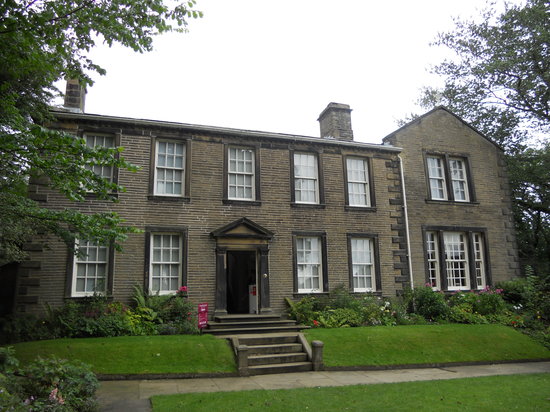


The Brontë Parsonage Museum is a writer's house museum maintained by the Brontë Society in honour of the Brontë sisters – Charlotte, Emily and Anne.
We are one of the oldest literary societies in the world, founded in 1893 and today we have a thriving worldwide membership. The Brontë Society is a charity and depends entirely on admissions and the generosity of members for its income. It is responsible for running the famous Brontë Parsonage Museum in the picturesque village of Haworth in West Yorkshire, once the home of the Brontë family and also for promoting the Brontës' literary legacy within contemporary society.
The Brontë collections at the Brontë Parsonage Museum are the largest and most important in the world and continue to inspire scholars, writers and artists. Our Contemporary Arts Programme includes literary events, exhibitions, artistic responses, a competition and festivals, and our lifelong learning programme enables us to reach students of all ages across the country.
Becoming a member of the Brontë Society supports our work especially as we celebrate the bicentenaries of Charlotte Brontë in 2016, Branwell Brontë in 2017, Emily Brontë in 2018 and Anne Brontë in 2020. By joining today you will assist us maintain the legacy of this remarkable family whose novels remain as popular today as when they were first published in the first half of the nineteenth century.
Admission Prices
Adult: £8.50
Concession (65+) £6.50
Student: £6.50
Child: £4.00 (under 5s free)
Family ticket: £20.00 (up to 2 adults and 4 children)
£10.00 (one adult and one child)
Booking
Advance booking is only required for groups of 10 or more visitors. Special group rates are available.
VIP Tours
VIP tours offer the opportunity to experience the Museum in the company of one of our knowledgeable guides. Advance booking is required.
Access to the Brontë Parsonage Museum is limited.
Facilities
The Museum does not currently have any toilets but there are some close by in the car park adjacent to the Museum. Haworth has a wealth of places to eat and drink, many just a few minutes' walk from the Museum.
ACCESSIBILITY
Footwear, wheelchairs and pushchairs: Haworth's streets are steep, and Main Street is cobbled with the square stones known as 'setts', so it's a good idea to wear low heels or flat shoes when you visit. It's also hard work pushing a wheelchair up to the top!
Disabled parking is available in the car park adjacent to the Museum, but there are steps between the two. Step-free access to the Museum from the car park can be gained via West Lane and by turning right at the Kings Arms pub and following the cobbled street up to the Museum.
Disabled access to the Museum: The Museum is a listed Georgian building with steps leading up to the front door. Unfortunately, there is no handrail, but we are happy to provide assistance with climbing the steps. We also have a wheelchair ramp on site which can be used to allow access to the ground floor of the Museum.
The Museum is split over two floors and access to the upper floor is not unfortunately not possible for those completely confined to a wheelchair. In addition, doorways on the ground floor of the Museum are narrow (61cm wide), but we have a wheelchair that fits through these that visitors are welcome to borrow. For those confined to a wheelchair and not able to use our our 'virtual tour' interactives, located on the ground floor, offer the chance to gain intellectual and visual access to the historic rooms and the collection.
Entry fees for disabled visitors and carers: If disabled visitors are able to visit only with the assistance of a carer, that carer is entitled to enter with them free of charge.
Large-print room guides are available for those who would like to use them.
Restrictions within the Museum: For the security and preservation of our collection, we do not allow food and drink on the premises or commercial photography and filming without prior arrangement. Visitors who wish to take photographs for their personal use are respectfully asked not to use a flash.
Registered assistance dogs, or registered assistance dogs in training, are welcome at the Museum. Other dogs are not allowed in the Museum, shop or garden.
Trained first-aiders are on hand at the Museum at all times should visitors require assistance.

